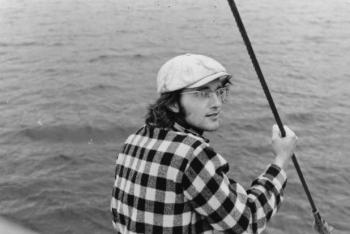Dan Earle

West Side Stories
These oral histories chart the personal stories of individuals with a longtime connection to the west side of Kodiak Island, defined for the scope of this project as the area buffeted by the Shelikof Strait that stretches from Kupreanof Strait south to the village of Karluk. The project endeavored to create historical primary source material for a region that lacks substantive documentation and engage west side individuals in the creation of that material.
Dan Earle was interviewed by Anjuli Grantham on August 1, 2015, at Bird Rock, Uyak Bay, Kodiak, Alaska, as part of the Kodiak Historical Society’s West Side Stories project. Dan Earle was born in 1946 in Baltimore, Maryland, and moved to Alaska in 1969. He reflects on the allure of living in an unspoiled nature in the wake of the back-to-land movement of the time, and details his early work experiences, including being a winter watchman, and working in the local canneries, New England Fish Company, and Wakefields. He describes the mix of Native and Scandinavian families and other characters living in the area, the welcoming and supportive community and the self-sufficiency that living in the area required, and his discomfort with the common segregation of Filipino workers in the cannery working environment. He and his wife Sandy began setnetting in Larsen Bay in the early 1970s, learning from the fishermen whose sites they worked on, both loving the independent lifestyle of a fisherman. He describes the gear they used, including fashioning their own anchors called kellicks, and using locally-made equipment like the Jake Laktonen skiff. He describes the relationship that he and other fishermen had with the cannery and the tenders that were used to transport fish to shore, and his feelings about the common attitudes to fishing regulations. He also mentions the positive impacts and stability of ownership that limited entry had for his generation of fishermen, his experiences of the Exxon Valdez oil spill, and his current concern for the status of some local fish species.
Please Note: The oral histories in this collection are protected by copyright and have been created for educational, research and personal use as described by the Fair Use Doctrine in the U.S. Copyright law. Please reach out Voices@noaa.gov to let us know how these interviews are being used in your research, project, exhibit, etc. The Voices staff can help provide other useful resources related to your inquiry.
The NOAA mission is to understand and predict changes in climate, weather, oceans, and coasts, to share that knowledge and information with others, and to conserve and manage coastal and marine ecosystems and resources. The Voices Oral History Archives offers public access to a wide range of accounts, including historical materials that are products of their particular times, and may contain offensive language or negative stereotypes.
Voices Oral History Archives does not verify the accuracy of materials submitted to us. The opinions expressed in the interviews are those of the interviewee only. The interviews here have been made available to the public only after the interviewer has confirmed that they have obtained consent.
